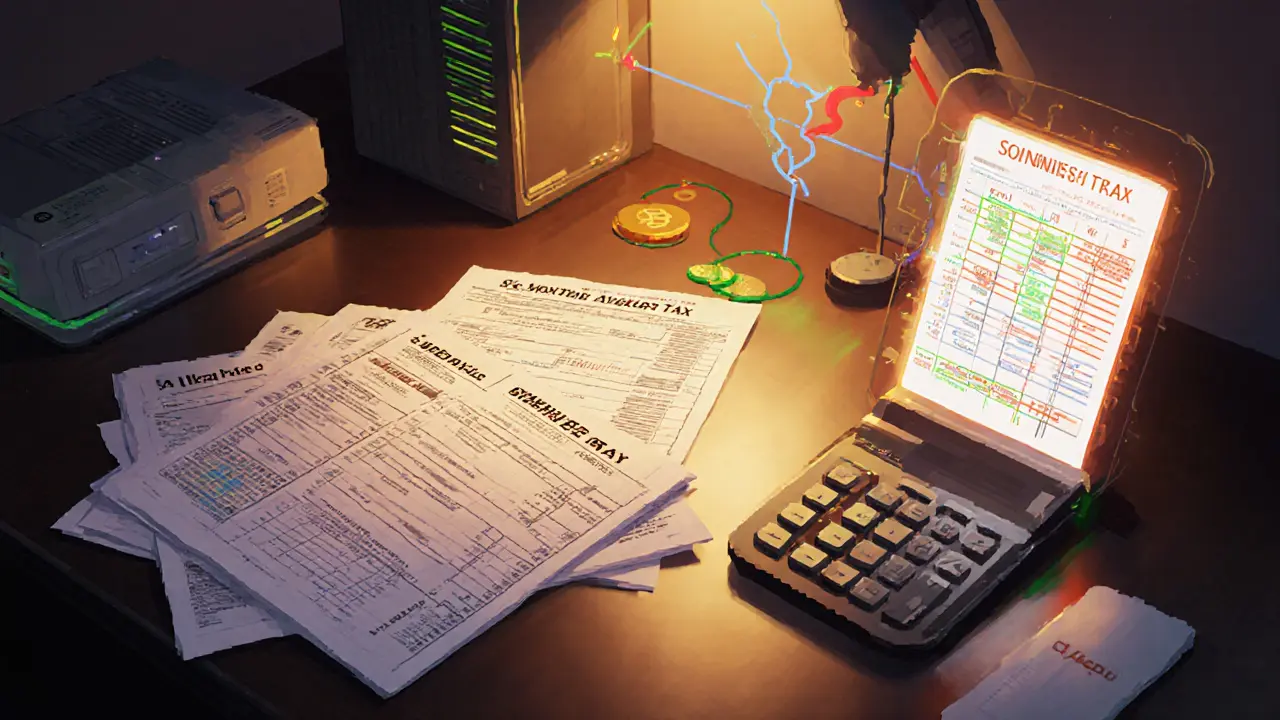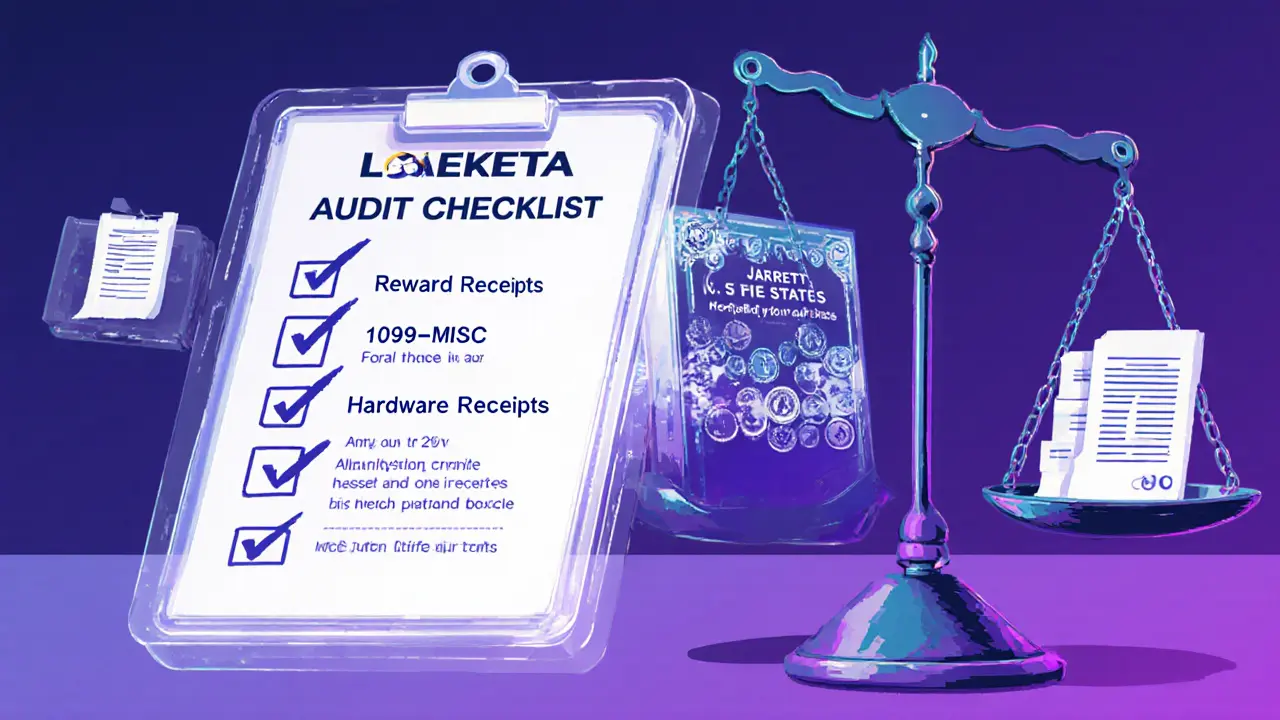Staking Rewards Tax Calculator
Tax Calculation Results
Enter values and click "Calculate Tax Implications" to see your tax breakdown.
Ever wondered why the IRS suddenly shows up on your crypto‑staking dashboard? The short answer: staking rewards are taxable income the moment you can move them, and any later sale can trigger a capital‑gain event. Below you’ll find a step‑by‑step rundown of how the United States treats staking rewards, what forms you’ll need, and how to keep records so the tax man doesn’t bite.
Why staking rewards aren’t “just” crypto‑interest
When you lock up assets on a proof‑of‑stake network, you’re not earning a simple interest‑style payment. The IRS looks at the reward as ordinary income because you receive a new piece of property - a token - that you can sell or transfer. The agency cemented this view in Revenue Ruling 2023‑14, which introduced the “dominion and control” test for cash‑method taxpayers. In plain English, the moment you gain the ability to dispose of the reward, that dollar amount becomes taxable.
When does the tax window open? The dominion and control standard
Imagine you earn 0.2ETH each month from staking. The IRS says you must record the fair market value (FMV) of that 0.2ETH on the exact day you receive it, regardless of whether you keep it, sell it, or move it to another wallet. The rule applies whether the reward comes straight from the blockchain or via a centralized exchange that reports on Form 1099‑MISC. The timing rule creates a cash‑flow challenge: you may owe tax on a reward you haven’t yet turned into cash.
Calculating ordinary‑income tax on receipt
Here’s the practical workflow:
- Identify the receipt date for each reward batch.
- Look up the USD FMV on that date (CoinMarketCap, CoinGecko, or an exchange price are acceptable).
- Multiply the token amount by the FMV to get the taxable amount.
- Sum all monthly amounts for the tax year and report them as "Other Income" on Schedule1, Line8, unless you qualify as a business (see below).
For example, if you receive 0.2ETH on March15, 2025, and the FMV is $1,800, you report $360 of ordinary income for that day.
What happens when you sell the reward? Capital gains rules
Later, when you decide to cash out, you create a second taxable event. The difference between the sale price and the FMV you reported as income becomes a capital gain (or loss). Holding period matters:
- Short‑term (≤1year): taxed at ordinary‑income rates.
- Long‑term (>1year): taxed at the lower long‑term capital‑gain rates (0‑20%).
Suppose you held that 0.2ETH for 14months and sold it when ETH was $2,200. Your cost basis is $360, sale proceeds $440, so you have a $80 long‑term gain taxed at the applicable rate.
Business vs hobby: Which tax form applies?
If staking is a side‑project you treat as a hobby, you’ll report the income on Schedule1. However, if you run a dedicated staking operation - think multiple nodes, paid staff, or significant capital outlay - the IRS may view it as a trade or business. In that case:
- Report earnings on ScheduleC (Profit or Loss from Business).
- Pay self‑employment tax (15.3% on net earnings).
- Deduct legitimate expenses (hardware, electricity, internet, software).
The line between hobby and business hinges on profit motive, time commitment, and whether you maintain proper books. BDO USA advises a thorough self‑assessment to avoid a bad audit surprise.

Reporting requirements from exchanges
Many exchanges now issue Form 1099‑MISC for staking rewards. The document shows the total USD value they calculated, but the IRS expects you to reconcile that with your own records. Failure to report a Form 1099‑MISC can trigger an audit - the Gordon Law Group reports that over 80% of crypto‑related audits start with a missing 1099.
Record‑keeping best practices
Accurate logs are the backbone of compliant staking tax reporting. Capture the following for each reward event:
- Date of receipt.
- Token amount received.
- USD fair market value on that date (source citation).
- Source of the reward (direct blockchain, exchange, DeFi platform).
- Subsequent disposition details (date sold, proceeds, holding period).
Automated tools like Blockpit can import transaction data, calculate FMV, and generate the Schedule1 line items for you.
Ongoing litigation and future uncertainty
The current framework comes from the July2023 IRS guidance, but the case Jarrett v. United States challenges it. The plaintiff argues staking rewards are “self‑created property” - akin to mining minerals - and should only be taxed when sold. While the courts haven’t ruled yet, the dispute highlights that tax treatment could shift, especially if the Sixth Circuit sides with the taxpayer.
Quick reference table
| Event | Tax classification | Tax rate | Form / Schedule |
|---|---|---|---|
| Reward receipt (dominion and control) | Ordinary income | Marginal income tax rate | Schedule1, Line8 (hobby) or ScheduleC (business) |
| Sale / disposal | Capital gain or loss | Short‑term: ordinary rate; Long‑term: 0‑20% | Form8949 & ScheduleD |
| Exchange‑issued 1099‑MISC | Reporting requirement | Matches ordinary income amount | Form1099‑MISC (info only) |
Action checklist for the upcoming tax season
- Gather all staking reward statements (exchange 1099‑MISC, blockchain receipts).
- Log each reward’s USD FMV on the receipt date - use a reputable price source.
- Determine if you qualify as a business; if so, calculate deductible expenses.
- Prepare Schedule1 or ScheduleC entries for the total ordinary‑income amount.
- Track each token’s eventual sale to compute capital gains or losses.
- Consider a tax‑software integration (e.g., Blockpit) to automate reporting.
Key takeaways
Staking rewards trigger two distinct tax events: income when you receive them, and capital gains when you later sell. Record‑keeping is non‑negotiable, and the form you file depends on whether the activity is a hobby or a business. Stay alert for the outcome of Jarrett v. United States, which could reshape the timing of income recognition. Until then, treat the staking rewards tax as an ordinary‑income event on receipt and plan for possible capital‑gain tax on disposal.

Frequently Asked Questions
Do I have to pay tax on staking rewards if I never sell them?
Yes. The IRS treats the reward as ordinary income the moment you gain control, regardless of whether you later convert it to fiat. You must report the USD fair market value on the receipt date.
What if I receive staking rewards on a foreign exchange?
U.S. tax law applies to worldwide income. You still owe tax on the USD value of the reward on the receipt date. Keep foreign‑exchange conversion records to substantiate the FMV.
Can I deduct the cost of my staking hardware?
Only if you file ScheduleC as a business. Expenses like servers, electricity, and internet can be deducted against your staking income. Hobbyists cannot claim these deductions.
How do I report staking income on my tax return?
For hobby‑level staking, list the total USD amount on Schedule1, Line8 under "Other Income." For business‑level staking, report net profit on ScheduleC and pay self‑employment tax.
What records should I keep for future audits?
Keep a spreadsheet or crypto‑tax software export that shows: date of reward, token amount, USD fair market value, source of reward, and any subsequent sale details (date, proceeds, holding period). Also retain 1099‑MISC forms and receipts for hardware or electricity expenses.







Stefano Benny
December 10, 2024 AT 02:21Staking rewards are taxable the second you can move them – 📈💰
Bobby Ferew
December 14, 2024 AT 07:21The IRS classifies every staking receipt as ordinary income, which means you have to report the FMV at the moment of dominion and control, regardless of whether you liquidate the token later.
celester Johnson
December 18, 2024 AT 12:21In the grand schema of fiscal entropy, each token you acquire via proof‑of‑stake is a fleeting embodiment of value, instantly transmuted into a taxable event the instant you can wield it.
Prince Chaudhary
December 22, 2024 AT 17:21Remember, the key to staying compliant is disciplined record‑keeping – jot down the date, token amount, and USD price, then you’ll avoid nasty audit surprises later.
John Kinh
December 26, 2024 AT 22:21Why bother with all this paperwork? It’s just crypto; the IRS will never catch it, right? 🙄
Mark Camden
December 31, 2024 AT 03:21Actually, the tax code is explicit: if you receive a reward, you owe ordinary‑income tax on its fair market value at receipt, and the IRS has been issuing 1099‑MISC forms for staking since 2023. Ignoring it isn’t an option.
Evie View
January 4, 2025 AT 08:21Look, if you think staking is just free money, you’re living in a fantasy. The tax man will take his cut as soon as you’re able to move the token.
Kate Roberge
January 8, 2025 AT 13:21Everyone’s acting like staking is a harmless hobby, but the IRS already treats it as ordinary income – so stop blowing smoke and start filing.
Oreoluwa Towoju
January 12, 2025 AT 18:21Great point about documentation, but also consider using tools like Blockpit or CoinTracker to auto‑populate your spreadsheet – saves a ton of time.
Jason Brittin
January 16, 2025 AT 23:21Wow, another "tax" post – guess the crypto‑world never learns. 🙃
Amie Wilensky
January 21, 2025 AT 04:21First, you must identify each reward receipt date; second, you must source a reliable FMV; third, you multiply token amount by FMV; fourth, you sum the totals for the tax year; fifth, you file Schedule 1 or Schedule C accordingly; sixth, you retain all supporting documents; seventh, you compute capital gains on any disposals; eighth, you report those gains on Form 8949 and Schedule D; ninth, you ensure any 1099‑MISC from exchanges matches your own calculations; tenth, you watch for future guidance that may change the treatment.
MD Razu
January 25, 2025 AT 09:21From a philosophical standpoint, the act of staking represents a delegation of trust in a network, yet the fiscal authority imposes a materialist valuation that reduces this trust to a taxable datum. By recognizing that each reward is simultaneously an incentive and a fiscal liability, we can appreciate the duality inherent in decentralized finance. This duality forces participants to confront the reality that decentralization does not equate to tax exemption. Moreover, the distinction between hobby and business hinges on the regularity and scale of the activity, which the IRS evaluates through the profit‑ motive lens. Consequently, the diligent staker must maintain meticulous ledgers, not merely for compliance but as a defensive posture against the inevitable audit scrutiny. In sum, the tax code transforms what appears to be passive accrual into an active accounting exercise, demanding both discipline and strategic foresight.
Charles Banks Jr.
January 29, 2025 AT 14:21Sure, the guide is thorough, but honestly, most people will just copy‑paste the numbers into TurboTax and hope for the best.
Ben Dwyer
February 2, 2025 AT 19:21Don’t forget: if your staking operation exceeds a hobby, you can deduct legitimate expenses like electricity and hardware on Schedule C.
Lindsay Miller
February 7, 2025 AT 00:21It can feel overwhelming, but breaking it down into simple steps-record receipt, note FMV, track sales-makes the process manageable.
Katrinka Scribner
February 15, 2025 AT 10:21Staking rewards might look like a nice little bonus on your portfolio, but the moment you gain control over those tokens, the IRS says, "That’s income, my friend!"
First, you need to grab the exact date you received each batch of tokens; the calendar matters because the price can swing wildly from day to day.
Second, you hunt down a reliable price source-CoinGecko, CoinMarketCap, or your exchange’s spot price-and lock in the USD value for that date.
Third, multiply the token quantity by that USD price; that product becomes your ordinary‑income figure, which you’ll file on Schedule 1 if you’re just a hobbyist.
If you run a full‑blown staking operation with multiple nodes, staff, and dedicated capital, you’ll likely be on Schedule C, and don’t forget the self‑employment tax on net earnings.
Fourth, keep every piece of evidence: screenshots, API logs, CSV exports-anything that proves you had dominion and control.
Fifth, when you finally sell, the IRS wants to know the difference between your sale proceeds and the cost basis you just recorded; that difference is a capital gain or loss.
If you held the tokens for more than a year, the gain is taxed at long‑term rates (0‑20%); if not, it’s short‑term and taxed like ordinary income.
Sixth, watch out for those 1099‑MISC forms from exchanges; they’ll report the total staking income they calculated, and you’ll need to reconcile that with your own numbers.
Seventh, if you miss a 1099, the audit risk jumps dramatically-over 80 % of crypto audits start with a missing 1099, according to the Gordon Law Group.
Eighth, consider automating the entire workflow with tools like Blockpit or CoinTracker; they’ll pull your blockchain data, compute FMVs, and generate the necessary tax forms for you.
Ninth, stay tuned to the legal landscape-cases like Jarrett v. United States could shift the timing of when staking rewards become taxable, potentially moving the event from receipt to disposition.
Tenth, even if the law changes, having a solid record now will protect you no matter what the future holds.
Eleventh, don’t forget to deduct any direct expenses if you qualify as a business-electricity, hardware depreciation, internet, and even a portion of your office space.
Twelfth, remember that every crypto transaction, even a zero‑value internal transfer, can have tax implications if it changes your control over the assets.
Thirteenth, be mindful of state tax obligations; many states conform to federal treatment, but a few have their own quirks.
Fourteenth, if you’re ever in doubt, consulting a tax professional with crypto experience can save you headaches and money down the line.
Fifteenth, the bottom line: treat staking rewards as ordinary income on receipt and plan ahead for potential capital‑gain tax when you sell; meticulous documentation is your best defense against the tax man.
VICKIE MALBRUE
February 19, 2025 AT 15:21Sounds like a lot, but you’ve got this – just keep a spreadsheet and you’ll be fine.
Waynne Kilian
February 23, 2025 AT 20:21Let’s keep the conversation civil; different perspectives help everyone learn.
Naomi Snelling
February 28, 2025 AT 01:21All this “official” guidance is just a front; the real power is in the hidden protocols that the government can’t see.
Michael Wilkinson
March 4, 2025 AT 06:21If you’re serious about staking, stop treating it like a hobby and start treating it like a business – then you can actually deduct expenses.
Billy Krzemien
March 8, 2025 AT 11:21Good point – aligning your tax approach with your operational scale keeps everything consistent and audit‑ready.
april harper
March 12, 2025 AT 16:21Sure, the tax code is a maze, but taking a philosophical step back reveals that every financial system demands some form of contribution to the collective.
Clint Barnett
March 16, 2025 AT 21:21When you dive into the nitty‑gritty of staking tax compliance, you’ll discover that a well‑crafted ledger is more than just a bureaucratic requirement; it becomes a narrative of your participation in the network, a chronicle that maps each token’s journey from reward to realized gain or loss. By capturing the timestamp, token quantity, and USD fair‑market value at receipt, you embed the economic reality of that moment into your records. Every subsequent sale or transfer adds another chapter, documenting holding periods that dictate whether the capital gain falls under short‑ or long‑term regimes. Moreover, categorizing your activity-whether hobby or trade-guides you toward the appropriate tax forms, from Schedule 1 to Schedule C, and informs the possibility of deducting legitimate expenses like electricity, hardware depreciation, and even internet bandwidth. Leveraging automation tools such as Blockpit or CryptoTaxCalculator can transform this narrative into a seamless, audit‑ready report, sparing you from manual spreadsheet gymnastics. Ultimately, the diligent staker who respects these procedural imperatives not only remains compliant but also gains strategic insight into profitability, risk exposure, and the broader economic impact of their staking endeavors.
Jacob Anderson
March 21, 2025 AT 02:21Nice summary, but let’s not pretend this isn’t just another way for the IRS to squeeze crypto enthusiasts.
Kate Nicholls
March 21, 2025 AT 02:21The guide is solid; just remember to keep every document handy in case the IRS decides to dig deeper.